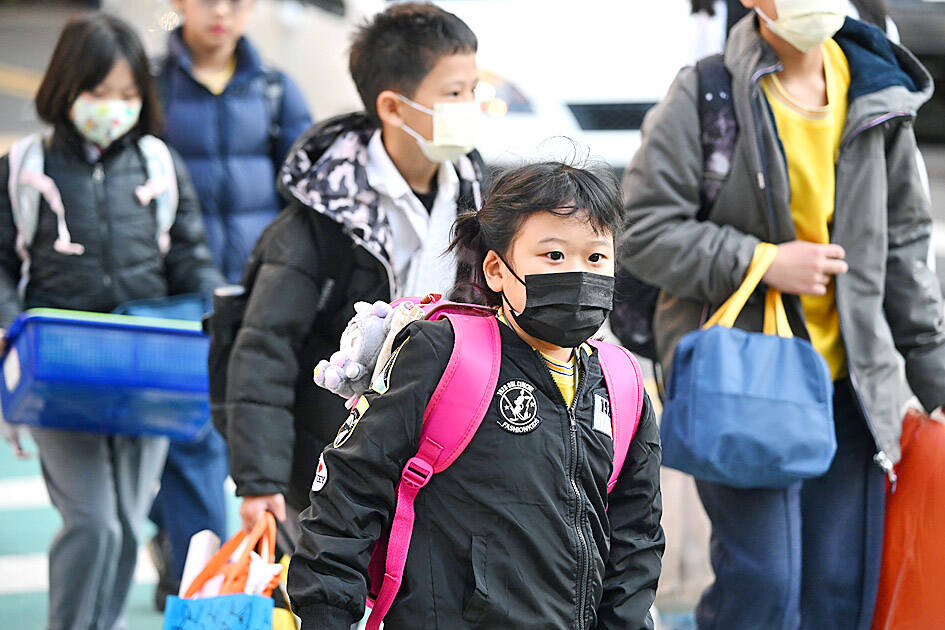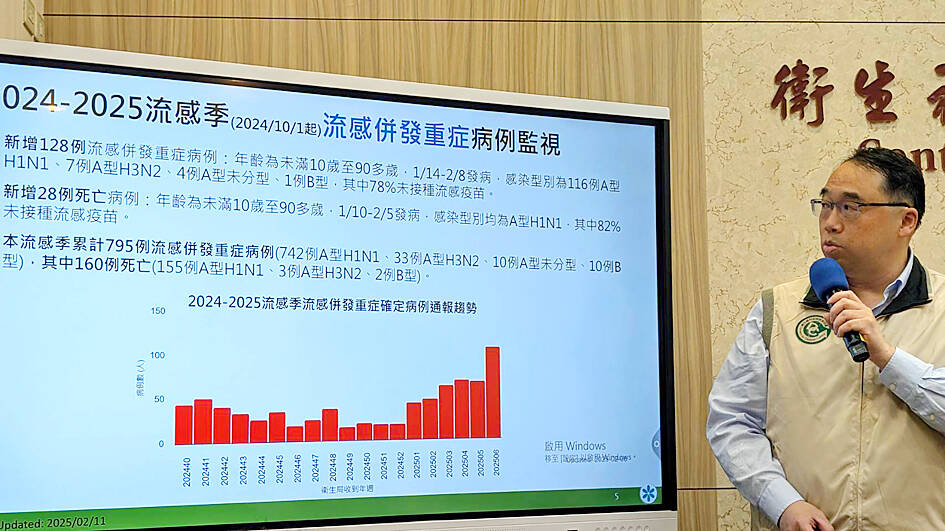More than 181,000 hospital visits for flu-like illnesses were reported last week, marking the highest level in a decade and surpassing a previous predicted peak for this season, the Centers for Disease Control (CDC) said yesterday, as it also reported the first local case of typhoid fever this year.
CDC Epidemic Intelligence Center Director Guo Hung-wei (郭宏偉) said disease surveillance data showed that the influenza A(H1N1) virus was still the dominant strain circulating in Taiwan in the past four weeks.
“There were 181,995 hospital visits for flu-like illness last week, and it is the highest number in the same week in 10 years,” Guo said.

Photo: Liao Yao-tung, Taipei Times
The centers also received reports of 128 severe flu cases, with the majority having the A(H1N1) virus, and 28 flu-related deaths, all due to the A(H1N1) virus, he said, adding that the number of severe cases has been increasing in the past few weeks.
An accumulated 795 severe cases, including 160 deaths, have been reported this flu season, which started on Oct. 1 last year, he said.
CDC physician Lin Yung-ching (林詠青) said one of the people who died last week was the youngest this flu season, a boy younger than 10 years old who had asthma and did not get vaccinated.

Photo: CNA
His symptoms included a fever, runny nose and cough with phlegm last month, but his condition rapidly worsened and he was rushed to hospital the next day with a fever of more than 40°C, loss of consciousness and difficulty breathing, Lin said.
The boy was also found to have septic shock and suspected acute necrotizing encephalopathy, so was admitted to an intensive care unit for treatment, but he developed multiple organ failure and died about a week later, he said.
The youngest severe case last week was a girl younger than five years old who received antiviral drugs after seeking medical attention at a clinic, but she was later rushed to hospital for spasms, altered consciousness, vomiting and a fever of more than 40°C, Lin said.
The girl was found to have developed encephalitis and she was being treated in an intensive care unit, he said.
The most common severe flu complication in adults and older children is pneumonia, but young children have a higher risk of developing encephalitis, and the disease progression is usually very fast, so parents should pay attention if their young children with the flu show signs of severe illness and seek medical attention, Lin said.
CDC Deputy Director-General Tseng Shu-hui (曾淑慧) said there are about 13,000 doses of government-funded flu vaccines still available and an additional 100,000 doses have been purchased which are expected to be available from Thursday next week, so people with higher risk of severe flu complications are advised to get vaccinated.
TOO MANY PATIENTS
Hospitals nationwide are quickly filling up due to cases of influenza, norovirus and extreme colds, leaving ventilators in short supply and some patients without a bed.
Emergency rooms were at capacity in many hospitals as of 12:30pm yesterday, Ministry of Health and Welfare statistics showed.
Meanwhile, Guo said the first local case of typhoid fever was reported last week, a teenage boy in northern Taiwan who began having a fever, muscle pain, sore throat, coughing, runny nose and mouth ulcers on Jan. 27.
He was hospitalized after seeking treatment, and diagnosed with typhoid fever on Wednesday last week.
Lin said the boy did not visit another nation, but did eat seafood with his family at a fishing harbor during the incubation period, and two other family members had diarrhea a few days after eating, so it could be that he got infected from eating contaminated seafood.
NOROVIRUS
There were 302,644 hospital visits for diarrhea last week, the highest number in the same week in a decade, and the 398 clusters of diarrhea cases reported in the past four weeks also mark the highest number in the same period in five years, Guo said adding that 98.6 percent of the tested clusters were infected with norovirus.

Japanese Prime Minister Sanae Takaichi yesterday lavished US President Donald Trump with praise and vows of a “golden age” of ties on his visit to Tokyo, before inking a deal with Washington aimed at securing critical minerals. Takaichi — Japan’s first female prime minister — pulled out all the stops for Trump in her opening test on the international stage and even announced that she would nominate him for a Nobel Peace Prize, the White House said. Trump has become increasingly focused on the Nobel since his return to power in January and claims to have ended several conflicts around the world,

UKRAINE, NVIDIA: The US leader said the subject of Russia’s war had come up ‘very strongly,’ while Jenson Huang was hoping that the conversation was good Chinese President Xi Jinping (習近平) and US President Donald Trump had differing takes following their meeting in Busan, South Korea, yesterday. Xi said that the two sides should complete follow-up work as soon as possible to deliver tangible results that would provide “peace of mind” to China, the US and the rest of the world, while Trump hailed the “great success” of the talks. The two discussed trade, including a deal to reduce tariffs slapped on China for its role in the fentanyl trade, as well as cooperation in ending the war in Ukraine, among other issues, but they did not mention

REASSURANCE: The US said Taiwan’s interests would not be harmed during the talk and that it remains steadfast in its support for the nation, the foreign minister said US President Donald Trump on Friday said he would bring up Taiwan with Chinese President Xi Jinping (習近平) during a meeting on the sidelines of the APEC Summit in South Korea this week. “I will be talking about Taiwan [with Xi],” Trump told reporters before he departed for his trip to Asia, adding that he had “a lot of respect for Taiwan.” “We have a lot to talk about with President Xi, and he has a lot to talk about with us. I think we’ll have a good meeting,” Trump said. Taiwan has long been a contentious issue between the US and China.

GLOBAL PROJECT: Underseas cables ‘are the nervous system of democratic connectivity,’ which is under stress, Member of the European Parliament Rihards Kols said The government yesterday launched an initiative to promote global cooperation on improved security of undersea cables, following reported disruptions of such cables near Taiwan and around the world. The Management Initiative on International Undersea Cables aims to “bring together stakeholders, align standards, promote best practices and turn shared concerns into beneficial cooperation,” Minister of Foreign Affairs Lin Chia-lung (林佳龍) said at a seminar in Taipei. The project would be known as “RISK,” an acronym for risk mitigation, information sharing, systemic reform and knowledge building, he said at the seminar, titled “Taiwan-Europe Subsea Cable Security Cooperation Forum.” Taiwan sits at a vital junction on